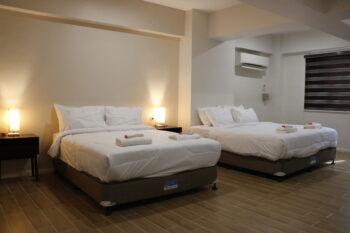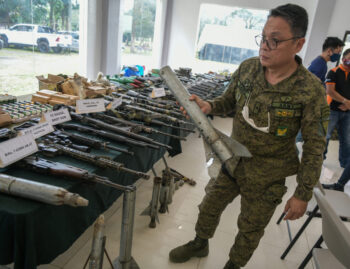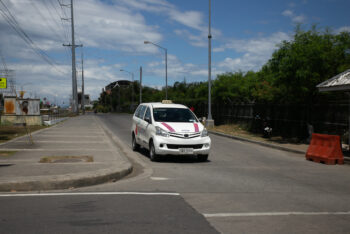DAVAO CITY (MindaNews/14 May) — If the rise of “promdi” Rody Duterte to the presidency is phenomenal in itself, what does one call the prospects of a Mindanao economic “rebirth” under his watch? Limitless? Overwhelming? Inspiring?
If residents and leaders in the island are wont to speak about possibilities in superlatives, one can hardly fault them. After all, their homeland has borne the brunt of official neglect for some time.
For starters, it is common knowledge that Mindanao is naturally rich. But despite this bounty, most of its people are poor. In fact, they aren’t just poor; they are marginalized on the fringes.
For example, with a land area three times the size of South Korea, the island produces 76 percent of the country’s total banana production, while churning out 48 percent of its total coconut output.
Yet noted sources like the Philippine Human Development Report have revealed that provinces like Basilan, Tawi-Tawi, Maguindanao, and Sulu are considered even poorer than the Mindanao average and have lower performance rates in education and health.
Mindanao has consistently had the lowest simple functional literacy rate compared to the rest of the country, on top of the fact that its people actually live 12 years shorter than those in Luzon and the Visayas, studies show.
What are people’s expectations for Mindanao as one of their own makes it to the highest office in the land?
Read on:
MARRIZ AGBON, founding executive director, Mindanao Business Council: “I anticipate a definite and heightened focus on 1) a homegrown resolution of the age-old conflict, 2) encouraging capacity-building in collective forms of engagement for small-scale agribusiness and SME development as a form of consolidation of community organizing efforts in the past year, 3) accelerating the establishment of key infrastructure along the value chain for Mindanao’s key commodities, 4) adopting a distributed power development action program for the island and 5) support for children and elderly (peace, collective self-help for inclusive economic growth, value chain infrastructure, distributed power and support for the challenged members of Mindanao society) — five tracks that can be pursued simultaneously with the end view of a fully-developed Mindanao.
“Mindanao can be organized along agri-economic hubs or communities along established commodity routes for vegetables, coffee, poultry for example supported with technology and market infra.
“Electric coops are assisted to develop their own sources of power embedded within their areas of operation. Support for the elderly like appropriate jobs or continuing physical rehabilitation.”
FEMY CALDERON, founding executive director, Mindanao Economic Development Council (Medco): “The Duterte Administration can put together a Policy Agenda categorized into three, namely: for modification, to be retained, and new ones to support poverty alleviation throughout Mindanao. These policies may be operationalized/realized/given life through strategies, programs, projects funded by the national budget, donor community, private sector (thru corporate social responsibility) and other sources all focused on poverty alleviation.
“It can harness resources/inputs/expertise via a participatory/partnership approach: national/regional/provincial local government units, business sector, civil society/NGOs, Christians, Muslims, IPs working together to address poverty alleviation through the implementation of common programs and projects (ex. education, health, nutrition, peace and order, insurgency, agricultural development, underground economy, etc.) in a common/adopted locale like among the rural areas in Sultan Kudarat, Maguindanao, Misamis Oriental, etc.
“It can also initiate a review/assessment of the current plan for Mindanao to generate a “picture of Mindanao now, where it is headed, opportunities and bottlenecks.”
NEILWIN JOSEPH BRAVO, Managing Editor, Edge Davao: “Mayor Duterte’s deeper understanding of the history, potentials and needs of Mindanao will be the lifeblood of the Mindanao development agenda. The uniqueness of Mindanao needs the wisdom and vision of a leader like Mayor Duterte who has a unifying influence on the diversities of Mindanao’s tri-people. It’s an advantage that Mindanawons listen to him and he listens to Mindanaoans.”
MAE FE ANCHETA TEMPLA, social worker, teacher, feminist: “I expect the Duterte administration to respond comprehensively to the issues of neglect and discrimination, a return to the negotiation table with the NDFP on the Comprehensive Agreement on Socio-Economic Reforms that outlines the concerns of the Moro and Lumad peoples.”
Can a Duterte Presidency benefit Mindanao?
GERALDINE V. QUIMOSING-TIU, Ateneo de Davao law professor, TV anchor: “Tremendously. If he succeeds to shift the form of government to federalism, less people will take up arms to fight for their autonomy, Mindanao’s peace and order situation will improve, focus will be on improving the economy.”
GUIDO ALFREDO DELGADO, former president, National Power Corporation; President, G.A.A. Delgado and Associates, Inc.: “The allocation of resources which is normally done through some arbitrary process in Manila can now have a more meaningful process that will benefit Mindanao.”
RICHARD HIRSCH, Chairman, Applied Planning and Infrastructure, Inc.; former senior official, Growth with Equity in Mindanao Program: “Duterte’s election will surely move Mindanao’s development forward. His understanding of the issues, sensitivities and legitimate concerns of all Mindanaoans helped him to successfully navigate the difficult cultural terrain in Davao. No doubt he and his team will now do the same for all of Mindanao.”
H.P. DE LEON, former Mindanao bureau chief, Businessworld: “For me, as far as the investment pull is concerned, even without the desired budgetary bias of the national government towards Mindanao, access to official development assistance would ease significantly. And then there’s private investments to boot. Bottom line, there’ll be investment confidence boost when the President comes from Mindanao.”
JANICE FAY SEVILLA, former Mindanao NGO worker, currently works as communications specialist in United Safety, a Dubai-based company: “I read somewhere that the plebiscite on federalism will be held midterm. So maybe the first three years will be spent cleaning up the country and simplifying processes. I don’t expect a lot of focus (money) poured in the regions except for special funds. But after the referendum, and hopefully people will vote YES to a federal government, I would expect a lot more focus on the regions including Mindanao.”
FERMIN D. ADRIANO, Economics lecturer, UP Los Banos: “Mindanao will be given appropriate attention and budget for the realization of its full development potential. Finally after centuries of neglect.”
DES MENDOZA-LOPEZ, Manila-based sociologist who has worked extensively with Mindanao civil society: “The hope is that a Duterte presidency will be the response to the so-called Manila imperialism which has pervaded for so long. i just hope that the experience of this “marginalization of the rich”–Mindanao being so rich and yet so deprived because of this thwarted system —will serve as Duterte’s guide to decision-making as regards development issues concerning Mindanao and the entire country in general. I hope he doesn’t lose that perspective of seeing the world from the margins so that whatever policy his administration makes will have teeth for the bit e.g. the Bangsamoro Basic Law, lumad issue the environment, etc.”
MONIQUE TEMPONGKO-VILLANUEVA, former senior staff, Medco, businesswoman: “Less than 24 hours after polls closed on May 9, I flew to Manila and took an UBER ride from NAIA 3 with, as fate would have it, a driver who hails from Cagayan de Oro. After disclosing that I, too, was a Mindanawon, we engaged in a light congratulatory banter, until he posed the question: Ma’am, karon na nidaug na si Mayor Duterte, unsay epekto ana sa Mindanao? And, in the broken Bisaya that I could muster, I poured out my heart full of hope for Mindanao with a Mindanawon President.
“1. For Mayor Duterte, unlike all other Presidents before him, his knowledge of the Moro insurgency problem does not come from history books or security briefings, but from his living and breathing encounters with this reality as he keeps his city (and his region) sheltered from the effects of this war. Only a chief executive who has a personal appreciation of the Moro armed struggle, coupled with a genuine empathy for the plight of the Muslims, can arrive at REAL solutions that work – not just on paper, not just on the negotiating table with OIC countries, but in the everyday life of every Muslim man, woman, and child who yearns for peace.
“2. Federalism will liberate Mindanao from its umbilical cord to the Manila-centric national government. We will finally have a Mindanao governed by Mindanawons, whose progress and prosperity will not hinge on Malacanang’s favor, but on the judicious use of our natural and man-made resources, governance free from patronage politics, and the collective efforts of its citizens in the public and private sector.
“3. The Mayor said it himself in his Town Hall meeting at UP Diliman hosted by CNN Philippines – ‘Manila? Wala na yan.’ Referring at that time specifically to the traffic plaguing the Metro, his Southern perspective allows him to boldly challenge the notion that Manila is the center of our universe. This, plus his 30-year experience in all branches of government, and his “balls of steel” equip him with both the technical and political will to move centers of governance to the country side, so that policies are formulated and sensible decisions are made close to where they can actually make an impact, and not just in the faraway palace by the Pasig river.
“4. And finally, in this emotionally-charged presidential elections, we witnessed how the Mindanao populace relentlessly campaigned and defended its maligned underdog candidate. If President Duterte can harness this energy, transitioning the same from campaign to responsible citizenry, then indeed, change is coming
RONALD G. SISON, freelance development consultant: During the campaign period, various groups advised voters not to vote for their candidates only because they are from the same city/province. I would like to believe that, like myself, the Mindanawons (and non-Mindanawons) who voted for President-elect Duterte did so not only because he’s a Mindanawon but more importantly because he understands Mindanao’s (and also the Philippines’) problems and can offer pragmatic solutions.
For Mindanao, it’s peace and development. They go hand in hand. Duterte knows that. That’s why his agenda is reconciliatory and unifying. Open/Diplomatic discussions and compromise among the major stakeholders (CCP/NDF, MILF, MNLF, lumads, etc.) rather than war or military action. Previous administrations have attempted to do the same but with little success because their formulas were limited and less inclusive, talking to just one or two stakeholder groups and excluding the others, while playing an on-and-off military game in between.
I would like to believe that on the strength of his federalism agenda, he understands that the key is to recognize Mindanao’s substantial role in the country’s economic growth–as a food basket, as a major export earner, as a strategic international logistics hub, as an international growth corridor, as a tourism powerhouse, as a manufacturing/processing hub, as a major supplier of management/skilled/semi-skilled manpower, and as home to an industrious, friendly and hospitable people—as well as to put in the necessary policy environment, funding, hard and soft infrastructure, implementation and monitoring mechanisms to realize this role.
He should probably start his anti-corruption and governance strengthening program in Mindanao, which could accelerate unleashing the island’s economic potentials.
PETER GONZALO SERENO, returning balikbayan to Mindanao: “The Duterte election will definitely accelerate the pouring of infrastructure projects. This is the natural ‘hometown’ effect as reflected by all previous presidents, more specifically for the first president to come from Mindanao.”
CHITO FUENTES, writer: Duterte enjoys a degree of trust more than any other President in the past simply because he is a Mindanawon. Except for the Lumad and the Moro who had lived in Mindanao all their lives and who do not trace roots to other parts of the country, majority came to Mindanao determined to start a new life on their own. Duterte enjoys a credibility among many of these residents because they know he is one of them. His vast experience not only as city mayor but as one who has gone out of his way to respond to challenges across the island has given him a wealth of knowledge and experience others do not have. These strengths put him in a far better position to address the needs of Mindanao and to give it the priority that the region has been denied since the republic’s inception.
(MindaViews is the opinion section of MindaNews. Nikki Rivera Gomez served as senior aide to then Presidential Assistant for Mindanao Paul Dominguez during the Ramos administration).







